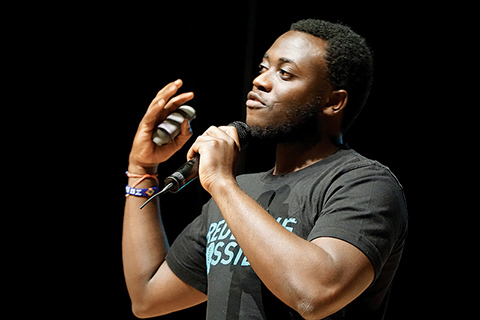At the age of five, in 1993, Michel Chikwanine was abducted by rebel militia in Beni, in the Democratic Republic of Congo, and forced to become a child soldier. His father, a human rights lawyer, was poisoned by enemies when Michel was 12. He and his family lived in a refugee camp in Uganda for five years. At the age of 16, in 2004, he, his mother and younger sister arrived as refugees in Canada. Chikwanine is now a student in U of T’s African Studies program. In October, he and co-author Jessica Dee Humphreys published a graphic novel for children about his experiences entitled Child Soldier: When Boys and Girls Are Used in War. He spoke recently to Stacey Gibson about his journey.
Can you talk about the abduction?
One morning, as I was getting ready to go to school, my father pulled me aside and was extremely adamant that I be home before 6 p.m. I promised him I would be.
At the end of the school day, I sat at my desk thinking, ‘Should I go home and be daddy’s good boy, or go to the soccer field to have fun instead?’ I chose to play soccer. I was playing with my friends when army trucks came racing toward the soccer field. The men weren’t wearing military uniforms. Chaos set in. I could hear gunshots. I could hear my friends screaming. I remember feeling so afraid, but, at the same time, because I had never heard of anyone being abducted before, my first thought was that my father had hired these soldiers to make sure we understood why we needed to be home before 6 p.m. So I started yelling at these soldiers, telling them they needed to let us go home. They hit me with a gun on top of my head and I passed out.
I woke up in a truck surrounded by soldiers with AK-47s. They were all laughing and I was crying, begging them to let me go home. After a few hours of driving, we arrived at a rebel camp. There was a skeleton nearby that I stepped on. As a five-year-old kid, terrified doesn’t even encompass what I felt. They told us they were going to initiate us into the army. They cut my left arm, and you can still see the scar. They rubbed a mixture of cocaine and gun powder into the wound. They put a blindfold on me and dropped an AK-47 in my hands. They kept yelling at me to shoot, so I pulled the trigger. When they took off the blindfold, I looked at my best friend, Kevin, lying there in a pool of blood. I was forced to kill my best friend at the age of five.
How did you escape?
After two weeks we were taken to a village, and told we needed to take it over. The commander gave the signal for some of the kids to attack on the left flank and others on the right. As people began running, it clicked in my head that I should run home. I ran into the jungle, for three days and three nights. I ended up in a town that wasn’t far from where my family lived. I met a man who put me on a bus, which took me back to my family. It’s a miracle that I was able to survive.
Why did you decide to write a graphic novel, with a target audience of children, about your experiences?
Right before my father was killed, one of the last promises I made to him was that I would fulfil one of his biggest dreams, which was to publish a novel. [Co-author] Jessica and I decided on the age range of 10 to 14, because these are the people who are soon going to be in positions of power. Whether they become politicians, or CEOs of companies or NGOs, they will make decisions that affect their peers all over the world. They need to make their decisions based on moral and ethical considerations and with a contextual understanding of the world.
How did you get to a point where you could write and speak publicly about your experiences?
It has taken me many years to understand the magnitude of my whole story. I didn’t tell anyone that I was a child soldier until I was 20 years old.
What has helped me overcome all the hardships is my father. In the graphic novel, he’s the central figure. My father was six-foot-eight, 250 pounds. Not only was he a giant man, but he was a human rights activist and a lawyer. When the war in the Congo was going on, he was writing articles to inform people that this war was not about African people killing themselves but about people fighting over minerals – minerals sold in Western countries. I remember him telling me the African proverb that if you ever think you’re too small to make a difference, try sleeping in a room with a mosquito. He left me with this incredible legacy of standing up for people, being an activist. And I couldn’t let my father’s legacy just disappear.
My mom and my sisters are huge examples of the spirit of African women. Men talk about courage. The first thing that always comes to my mind is my mom. When we lived in the refugee camp in northern Uganda, my father was assassinated in 2001, and we hadn’t gotten a refugee number yet. A refugee number is like a piece of ID; we needed to get it to be recognized, to be protected as refugees. And so my mom would wake up at 5 every morning, walk for three hours to the United Nations office in Kampala. That’s one of the most dangerous streets for women at night. It’s still dark at 5 a.m. She did this from 2001 until 2004 when we got a refugee number. Every day, by herself. That’s being able to understand that to survive, to do something in order to make a positive impact, it takes relentless action and absolute courage.
What has also helped me is that I don’t look at my story as just my story. I look at it as intertwined with the stories of struggle of many people around the world who are either trying to find their humanity or who are trying to make the world a better place. I see my story when I turn on the news and see Syrian refugees running away, trying to be recognized as human beings. I see it in people who struggle with depression. It’s intertwined with the story of poverty and hunger. That hurt, that journey of going through what I went through, has helped me realize that I have to care for other people, because I live in a country that gives me the opportunity to do that in every way. If I can inspire someone to become a social activist, if I can inspire someone to see the world in a very different way, then I am fulfilling that story that’s not just mine.
What do you want to do in the future?
I want to go back to the Congo to help restructure the education system, which is rooted in colonialism – to help train good teachers, and to give them the resources to teach critical skills to their students. We take critical skills for granted, and I think the ability to decipher information, which I have learned here at U of T, is not taught in many parts of the world.
When I came here, I believed the colonial version of history that Africa was saved by Europeans. U of T’s African Studies program is incredible because it goes into pre-colonial Africa. It really added depth and context to my understanding, and inspired me to start being very critical.
What would you hope to see as a result of a change in the education system?
Humanitarianism pushes NGOs as the answer to Africa’s problems. I really don’t think they are. The problem I have with humanitarianism is that it’s a very similar system to colonialism. It’s importing an ideology and a way of doing things, and doesn’t put the African people in positions of power to be able to understand and control that system or move things forward when NGOs leave.
A shorter version of this Q&A appeared in the print edition of U of T Magazine.
Michel Chikwanine talks about child soldiers
Recent Posts
U of T’s 197th Birthday Quiz
Test your knowledge of all things U of T in honour of the university’s 197th anniversary on March 15!
Are Cold Plunges Good for You?
Research suggests they are, in three ways
Work Has Changed. So Have the Qualities of Good Leadership
Rapid shifts in everything from technology to employee expectations are pressuring leaders to constantly adapt







One Response to “ War Child ”
Thank you, Michel, for your campaign to end the use of Child Soldiers. I have heard you speak, read your writings and watched this video. I admire your determination to use education to end this horrible nightmare for all children. May you and the efforts of others, including Gen Romeo Dallaire, ultimately end this practice.